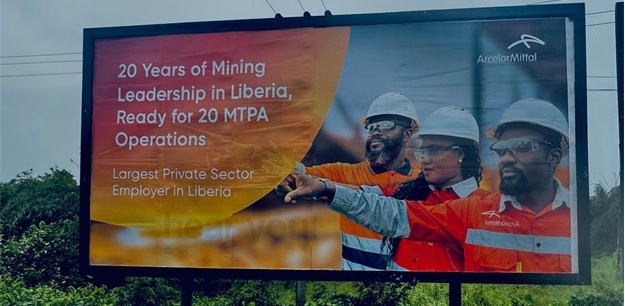MONROVIA – Liberia’s reliance on ArcelorMittal Liberia (AML) as its single largest taxpayer for nearly two decades however welcoming and commendable raises critical questions about the country’s economic structure and future direction. According to pundits, despite paying over $400 million in taxes, royalties, and other obligations, AML’s dominance highlights Liberia’s failure to diversify its economy, leaving it vulnerable to commodity shocks and policy uncertainty. As the company embarks on a multi-billion dollar expansion, the stakes are higher than ever for Liberia to convert its natural resources into sustainable development and broader national prosperity. The Analyst reports.
Nearly twenty years after ArcelorMittal entered Liberia’s mining sector, the company remains the country’s single largest contributor to government revenue. Financial records show that ArcelorMittal Liberia (AML) has paid more than US$400 million to the Government of Liberia since 2005 through taxes, royalties, and other statutory obligations.
This excludes non-MDA associated commitments like the school, clinics, roads rehabilitation, the construction of the Ganta Yekepa Road and several others that amount to millions as well
The Liberia Revenue Authority has repeatedly recognized the company as the nation’s highest taxpayer, a position it has held for much of the last two decades.
Yet as Liberia aims for a more ambitious economic trajectory, including a US$1.2 billion national budget a deeper question emerges: what does ArcelorMittal’s dominance in revenue generation reveal about Liberia’s economic structure, vulnerabilities, and future direction?
ArcelorMittal’s fiscal imprint is undeniable. More than US$120 million in royalties and over US$148 million in withholding taxes underline the scale of its operations. These contributions have financed annual budgets, supported public services, and provided a measure of economic stability in a country that often struggles with fluctuating revenue streams.
Today, this conversation extends beyond past payments to the company’s potential future impact. ArcelorMittal is in the midst of its long-delayed Phase II expansion — a multi-billion dollar investment that, once completed, will transform Liberia’s iron ore sector.
The expansion includes the construction of a new processing plant capable of producing high-grade 15–18 million metric tons of iron ore annually. This represents a major shift from the current direct shipping ore model and positions Liberia to move into higher-value beneficiation and more competitive global markets.
If the expansion reaches full production, AML is expected to contribute more than US$200 million annually to the national budget through taxes, royalties, and fees. This level of fiscal inflow would be unprecedented in the history of Liberia’s mining sector and would dramatically reshape the government’s budgetary outlook. The associated increase in local employment, procurement, and community development could also drive broader economic activity across Nimba, Bong, and Grand Bassa counties.
However, Liberia’s dependence on one concessionaire — even one with higher future potential — highlights key structural risks. A situation where a single company remains the backbone of national revenue for twenty years signals a failure to diversify the economy. Agriculture, fisheries, and manufacturing remain underdeveloped, while other concessions frequently fall short of revenue and employment expectations. This overdependence exposes the country to commodity shocks, operational delays, global price fluctuations, and policy uncertainty.
The delayed expansion itself illustrates these risks. Political interference, concession renegotiations, and the ongoing debate over rail and port access have slowed progress for years. While AML has continued operations, any major disruption — from price collapse to infrastructure challenges — would immediately reverberate through the national budget.
Moreover, the question is not simply whether ArcelorMittal pays; it is whether Liberia has effectively used the revenue. Weak public financial management, recurrent leakages, and underinvestment in health, education, energy, and infrastructure have limited the long-term benefits of natural resource revenues. Without stronger governance reforms, increased contributions from AML’s expansion risk being absorbed into the same inefficient systems.
Liberia’s policy direction will determine whether the next decade of mining revenue leads to transformation or further dependency. Emerging competitors like Ivanhoe Liberia/HPX are seeking access to national rail infrastructure, and their proposals have generated political excitement and controversy. Yet none currently offer the scale, readiness, or guaranteed fiscal returns that AML’s expansion presents.
ArcelorMittal’s two-decade tenure as Liberia’s leading taxpayer is therefore both an asset and a warning signal. It demonstrates the value of a concessionaire that consistently meets its obligations, but it also reveals how little Liberia has diversified its economy since AML’s arrival. If the company’s expansion succeeds, Liberia could see annual revenues unprecedented in its modern history. But without stronger governance, transparency, and a broader development strategy, the country risks entering another decade where growth depends overwhelmingly on a single mining operation.
The question is no longer whether ArcelorMittal has contributed — the evidence is clear. The real question is whether Liberia can convert today’s revenues and tomorrow’s expanded fiscal inflows into a foundation for broader national prosperity, or whether the next twenty years will mirror the last: reliant, unbalanced, and vulnerable.

Comments are closed.